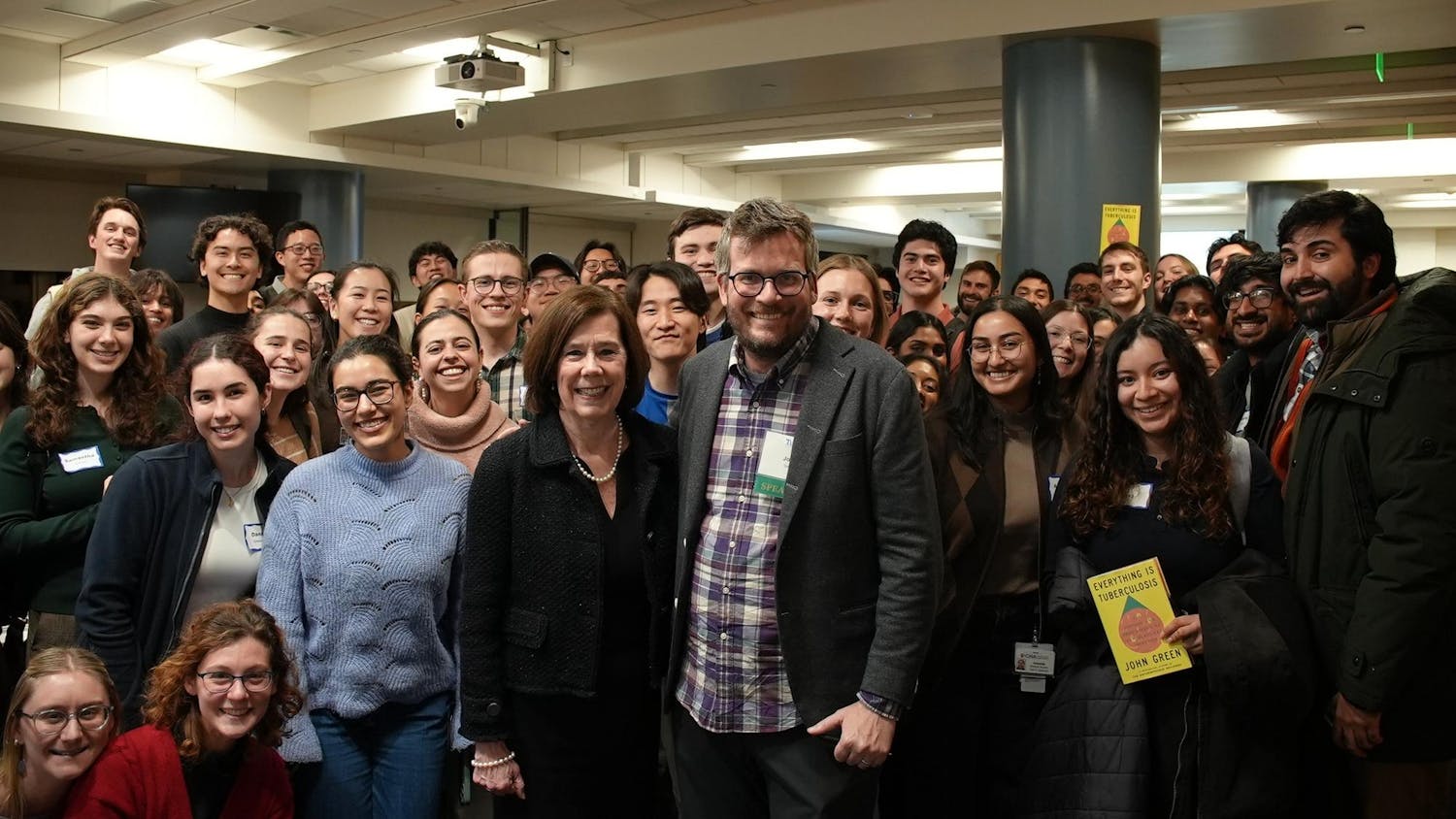In Sam Lobley’s creative writing senior honors thesis proposal, he wrote of plans to portray characters whose lives were not defined by illness. Containing one story with autobiographical elements, his short story collection “Not in the Image of Gods” explores the role of illness in family and personal life as well as life beyond disease or disability.
"Illnesses are often portrayed quite dramatically in popular culture — authors illustrate them as tragic or attempt to romanticize the suffering," Lobley wrote in the proposal. "I will take a more realistic approach, showing illness and disability as a component of people's lives, but not the definition of them."
Lobley, a Class of 2019 student from Long Island, N.Y., died days before graduation in May after a long battle with cystic fibrosis and complications from a lung transplant, according to an announcement from the Office of the President. At Tufts, his work ethic and aptitude on the page inspired professors and students alike.
“How fortunate you are to have lived in the time of Sam Lobley,” Tufts Commencement speaker Alfre Woodard said to the Class of 2019, “to have been inspired by his perspective, touched by his kindness, stirred by his ideas and infected by his joy.”
Lobley excelled academically throughout his college career. He was elected to Tufts Phi Beta Kappa in January; in May, he was to be awarded the Tufts Department of English Prize at graduation and had earned summa cum laude Latin honors as well as honors for his senior thesis.
“Sam thoroughly enjoyed his time at Tufts. He loved being a student,” Lisa Lobley, Lobley’s mother, said. “He was so excited to have that opportunity … he never took the privilege of being a college student for granted.”
Tufts English Professor Jonathan Wilson, who taught Lobley in two creative writing classes and directed his senior honors thesis, said that he stood out in class for his wit and insightful feedback.
“First of all, he was a wonderful writer,” Wilson said. “Secondly, he was sort of an indelible presence in the classroom, and a very … fair and honest participant in the workshops. Sam was always a very perceptive and generous critic of others' work, in addition to being a very engaging writer himself.”
While growing up, Lobley played the piano, violin and saxophone and acted in musical theater productions. Additionally, he was a hardworking student who took school seriously.
“He wanted to be known as a student first always,” Lisa Lobley said. “Even as a younger kid … to be honest, the one thing that came easily to Sam in his life was school. He loved it; he loved to learn.”
During his senior year, Lobley and his mother lived briefly in Texas while waiting for a pediatric lung transplant. He took advantage of his time in Houston by writing the mystery novel “No One Is Innocent” for a school assignment. The novel can be purchased from Dog Ear Publishing.
At Tufts, Lobley was known as a determined student who remained dedicated to school despite difficult circumstances.
“Although it took an extraordinary effort for him to get to class, to be in class, he never allowed his illness to define him,” Wilson said. “He maintained a kind of extraordinary wit and a great sense of humor and he was just a … wonderful and courageous human being.”
While parts of Lobley’s senior thesis contained autobiographical elements, Wilson said that his work more broadly addressed the complex impact of illness on families, with characters in various short stories facing distinct challenges.
“I've always felt that he was somewhat influenced by Raymond Carver,” Wilson said. “The stories … would build very slowly, towards a very punchy ending … they’re very alert to the nuances of character.”
Shane Woolley (A'19), who was Lobley’s classmate in an Experimental College seminar, described him as a thoughtful student that he admired in school.
“He was an incredibly smart and kind guy who was usually quiet, but when he spoke everybody paid attention,” Woolley told the Daily in an electronic message.
Amrutha Chintalapudi (A'19), Lobley's classmate in Spanish 2 and 3, echoed Woolley's sentiments, praising Lobley's work ethic and drive to take classes in a wide variety of subjects while at Tufts.
"Taking as many things as he did, knowing his health condition, he must have really loved school," Chintalapudi said. "He was a wonderful person, and it's sad that he was dealing with this for the majority of his life. It was just not something anyone could imagine."
Fletcher Professor of English Literature Lee Edelman, who taught Lobley in his class on Alfred Hitchcock's films, described him as a surprising student in many ways.
“He had an incredibly deep, loud voice, and he himself was rather small and slight and that discrepancy seemed to suggest that this very small body contained within it so much more than was visible on the outside,” Edelman said. “I think that was reflected in his passionate engagement with ideas and his real capacity to absorb and to produce new ways of thinking.”
Edelman’s class was located in Tisch Library. Although the Tisch Library website states that the building's entrances and exits are accessible, Edelman said the lack of disabled parking spots located near the building’s entrance had made it difficult for Lobley to get to class.
“I do think that one way the university could honor Sam is to think seriously about issues of ability and disability on campus, and to think about, for instance, dedicating in his honor a parking space or a series of parking spaces so that every student on campus could have access to Tisch Library,” Edelman said.
Ms. Lobley recommended that those interested in contributing to efforts against cystic fibrosis consider donating to CF Bridge of Hope. According to the Cystic Fibrosis Foundation Patient Registry, more than 30,000 people live with cystic fibrosis in the United States today.
“He never defined himself by his illness,” Ms. Lobley said of her son. “He wanted to be known as a student first always. Even as a younger kid, he would never ask for anything even that he was entitled to because of his illness … he never felt sorry for himself. He was always trying to live the best life that he could.”
More from The Tufts Daily
Serve & Survey: Emotionally editing humanity
By
Jaylin Guzman
| February 20





